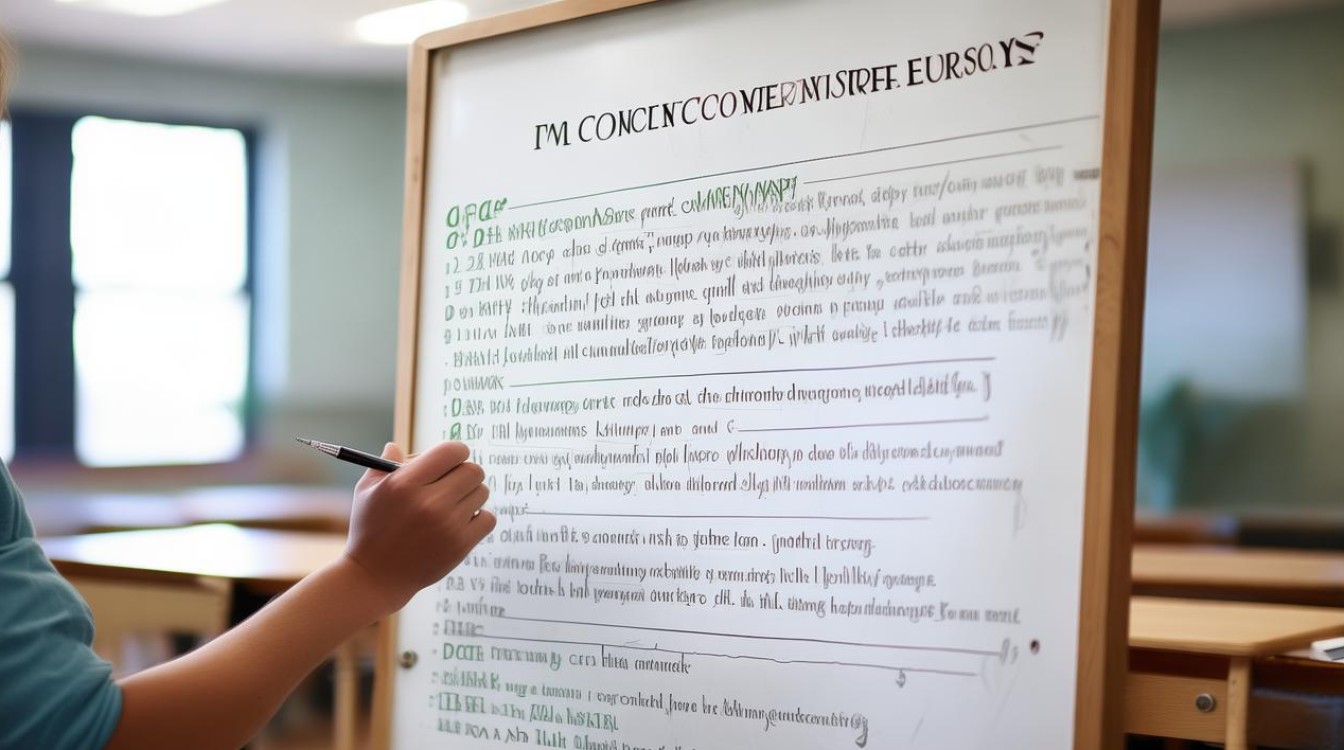托福写作的结尾段是整篇文章的点睛之笔,直接影响考官对文章的整体印象,许多考生在结尾部分容易犯一些低级错误,尤其是单词使用不当,导致表达不够精准,甚至影响逻辑连贯性,本文将详细分析托福作文结尾常见的错误单词,并提供正确的替代方案,帮助考生提升写作质量。

过度使用“finally”
很多考生习惯在结尾段使用“finally”来总结观点,但这个词在英语中通常用于列举的最后一项,而不是纯粹的总结,如果全文没有明显的分点论述,强行使用“finally”会显得突兀。
错误示例:
Finally, I believe that technology improves our lives.
改进方案:
- In conclusion, technology significantly enhances our lives.
- To sum up, the benefits of technology outweigh its drawbacks.
滥用“in a word”
“In a word”直译是“用一个词来说”,但很多考生误用它来引出完整的句子,这在语法上是不恰当的。
错误示例:
In a word, we should protect the environment.
改进方案:
- In short, environmental protection is crucial.
- Simply put, we must take action to safeguard our planet.
误用“last but not least”
这个短语通常用于列举的最后一个要点,但不少考生错误地把它当作总结句的开头,导致逻辑混乱。
错误示例:
Last but not least, education is important for everyone.
改进方案:
- Most importantly, education plays a vital role in personal development.
- Above all, education is the foundation of a prosperous society.
“All in all” 使用不当
“All in all” 在口语中较为常见,但在正式的托福写作中显得不够严谨,容易让考官觉得表达随意。
错误示例:
All in all, governments should invest more in public transportation.
改进方案:
- Overall, increased investment in public transport is essential.
- In summary, prioritizing public transit funding yields long-term benefits.
“So” 作为总结词
“So” 在口语中常用来过渡,但在书面写作中作为总结词显得过于随意,缺乏正式感。
错误示例:
So, we must take action to reduce pollution.
改进方案:
- Therefore, immediate measures are necessary to combat pollution.
- Thus, reducing emissions should be a global priority.
“That’s why” 过于口语化
“That’s why” 在学术写作中显得不够正式,容易让文章失去严谨性。

错误示例:
That’s why we need stricter environmental laws.
改进方案:
- For this reason, stricter environmental regulations are imperative.
- Consequently, governments must enforce more robust environmental policies.
“I think” 削弱说服力
在结尾段使用“I think”会让观点显得主观,降低论证的权威性,托福写作更强调客观分析,而非个人感受。
错误示例:
I think renewable energy is the best solution.
改进方案:
- Evidence suggests that renewable energy is the most viable solution.
- Research indicates that transitioning to renewables is essential.
“Hope” 表达不够有力
“Hope” 在议论文中显得过于温和,无法体现论证的坚定性。
错误示例:
I hope people will realize the importance of conservation.
改进方案:
- It is imperative that society recognizes the value of conservation.
- Governments must ensure public awareness of environmental preservation.
“Maybe” 显得不确定
托福写作要求观点明确,使用“maybe”会让结论显得模棱两可。
错误示例:
Maybe stricter laws can reduce crime rates.
改进方案:
- Stricter legislation has been proven to lower crime rates.
- Empirical data supports the effectiveness of stringent laws in crime prevention.
“Very” 缺乏精确性
“Very” 是一个弱化修饰词,在学术写作中应尽量避免,改用更具体的词汇增强表达效果。
错误示例:
Education is very important for career success.
改进方案:
- Education is crucial for professional advancement.
- Academic qualifications significantly influence career trajectories.
“A lot of” 不够正式
“A lot of” 在口语中常见,但在托福写作中应替换为更正式的词汇。
错误示例:
A lot of students struggle with time management.

改进方案:
- Numerous students face challenges in managing their time effectively.
- A significant proportion of learners find time management difficult.
“Nowadays” 被过度使用
“Nowadays” 在托福写作中已经被大量考生使用,容易显得陈词滥调。
错误示例:
Nowadays, technology plays a big role in education.
改进方案:
- In the modern era, technology has revolutionized education.
- Contemporary advancements have transformed learning methodologies.
“More and more” 结构松散
“More and more” 在正式写作中显得不够精准,建议使用更具体的表达方式。
错误示例:
More and more people are using smartphones.
改进方案:
- An increasing number of individuals rely on smartphones.
- Smartphone adoption rates continue to rise globally.
“Everyone knows” 过于绝对
“Everyone knows” 这样的表达缺乏严谨性,容易让考官质疑论证的客观性。
错误示例:
Everyone knows that exercise is good for health.
改进方案:
- Extensive research confirms the health benefits of regular exercise.
- Scientific evidence overwhelmingly supports the positive effects of physical activity.
“In my opinion” 显得主观
托福写作更强调基于事实的论证,而非个人观点陈述。
错误示例:
In my opinion, online learning is more effective.
改进方案:
- Studies demonstrate that online learning can enhance educational outcomes.
- Statistical analysis reveals the efficacy of digital education platforms.
“For example” 在结尾段不合适
结尾段的作用是总结而非举例,for example”在此处显得结构混乱。
错误示例:
For example, we should recycle to protect the environment.
改进方案:

- Recycling initiatives are a practical step toward environmental sustainability.
- Implementing waste management policies can mitigate ecological damage.
“First of all” 在结尾段逻辑错误
“First of all” 用于开头列举,在结尾段使用会导致逻辑混乱。
错误示例:
First of all, we must address climate change immediately.
改进方案:
- Urgent action is required to combat climate change.
- Immediate measures must be taken to mitigate global warming.
“In fact” 在结尾段显得冗余
“In fact” 通常用于补充说明,但在总结段使用会显得多余。
错误示例:
In fact, education is the key to social progress.
改进方案:
- Education serves as the cornerstone of societal advancement.
- Undoubtedly, education drives economic and cultural development.
“Actually” 削弱正式感
“Actually” 在口语中常见,但会降低书面表达的严谨性。
错误示例:
Actually, governments should prioritize healthcare.
改进方案:
- Governments must allocate greater resources to healthcare systems.
- Healthcare funding should be a top priority for policymakers.
“Anyway” 过于随意
“Anyway” 在正式写作中显得不专业,应避免使用。
错误示例:
Anyway, we need to protect endangered species.
改进方案:
- Protecting endangered wildlife is a moral and ecological imperative.
- Conservation efforts must be intensified to prevent species extinction.
托福写作的结尾段需要简洁有力,避免使用上述错误单词,选择更精准、正式的表达方式,通过优化措辞,考生可以提升文章的逻辑性和说服力,从而在考试中取得更高分数。

